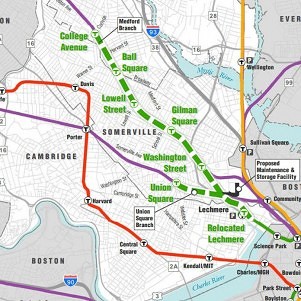Update on the State of the Green Line Extension
The idea for the Green Line Extension (GLX) has been around for years, and its potential benefits have led many to call it a critical economic and environmental infrastructure project. So, when the first phase of construction began in 2012, it was met with great excitement. Fast forward to 2016, and much of that initial enthusiasm has been curbed with skepticism. Construction has been painfully slow, and project cost estimates escalated as high as $3 billion (now at $2.3 billion).
Yet, despite concerns over the MBTA’s capacity to manage an operation of this scale and scope, the project is still very much alive. In May, a new, independent interim project management team commissioned by the MBTA Fiscal Management Control Board (FMCB) and the Mass DOT Board of Directors released its redesigned GLX budget. The new budget outlines a more streamlined approach than its predecessor did, and estimates with “90% certainty” that if the proposed changes are implemented, the commonwealth should save approximately $750 million by cutting out non-essential construction and maintenance costs.
The key change to keep an eye on is the decision to implement a Design-Build approach to the construction rather than the Construction Manager/General Contractor (CM/GC) one previously used. As Pioneer already reported last fall, this was a failed experiment, and ultimately ended with termination of contractor White-Skanska-Kiewit (WSK). The boards hope that this method will allow for increased flexibility and more open dialogue with new contractors.
But how much confidence can we really have when the project was at one point more than double the original estimate? Furthermore, a funding gap still exists, and Somerville and Cambridge, (which along with Medford are the cities the GLX will primarily serve) recently agreed to a request to commit an additional $50 and $25 million, respectively, on top of already significant investments from local stakeholders.
This project has huge financial and logistical implications that will greatly affect not just riders, but all state taxpayers for years to come. While the latest plan may seem to be a significant improvement from the first proposal, it only scratches the surface of a complex dilemma that currently faces the commonwealth. The FMCB and MassDOT boards need to honestly answer the tough question of whether and when it is time to cut losses, and spare further taxpayers’ dollars.
However, they do not appear ready to give up any time soon. Both boards have voted to continue the construction already underway, but they cannot undertake any further construction until the Federal Transit Administration (FTA) reviews the new proposal to determine if the GLX is still eligible for its New Starts Federal Grant. Keeping the $1 billion grant is critically important to keeping the project alive. If it were lost, it would almost certainly force the MBTA to abandon the project.
A June 20th update suggests that some recent progress has been made, including hiring a consulting firm ASCENT to advise on project management going forward, securing $152 million in Federal Highway funding from the Boston Region Metropolitan Planning Organization (Boston Region MPO), and submitting the redesigned budget to the FTA.
To the MBTA’s credit, the outside agency’s latest report acknowledges the lack of experienced MBTA personnel that led to its initial problems with both the design, and procurement phases of the project. It also admits that the project has been unsuccessful until now largely because there was too little supervision of independent contractors.
The new budget will keep all the proposed stations and the same number of trolleys, while eliminating some previously included station amenities such as escalators, elevators, fare gates, and automated storage facilities. The interim project management team says this will not only save money, but also significantly speed up the construction timetable.
However, there is a catch. According to the report, “the independent MBTA interim project management team’s estimate and schedule is dependent upon the ability of MBTA management to properly implement and monitor the project even as it continues to work on improving the reliability of its core system.”
The success of the GLX project going forward hinges on practical and efficient management, something that has thus far been one of the MBTA’s biggest failings. There are a lot of question marks, and their performance up until this point does not signal that they are up to the task. Stay tuned, as the end to this ongoing saga appears to be nowhere in sight.



